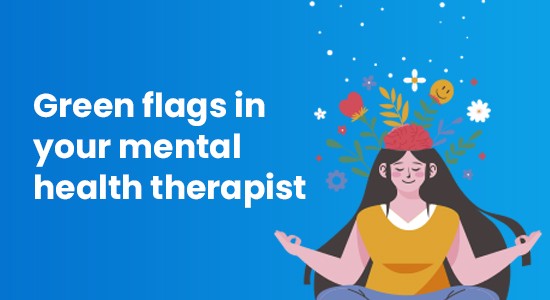Green flags in your mental health therapist
Green flags in your mental health therapist
When seeking a mental health therapist, it’s important to find someone who is not only qualified but also exhibits certain green flags that indicate they are a good fit for you and your needs. Green flags can be seen as positive attributes or signs that a therapist possesses qualities that can contribute to a positive therapeutic relationship and successful treatment outcomes. Here are some green flags to consider:
Empathy and Compassion: A great therapist demonstrates genuine empathy and compassion towards their clients. They are able to understand and validate your emotions without judgment, creating a safe and supportive environment for you to express yourself.

Active Listening: An attentive and active listener is a valuable quality in a therapist. They give you their undivided attention, focus on what you’re saying, and ask thoughtful questions to gain deeper insights into your experiences and concerns.
Non-Judgmental Attitude: A good therapist creates a non-judgmental space where you can feel comfortable sharing your thoughts, feelings, and experiences openly. They understand that everyone has unique perspectives and values and approach your situation without bias or criticism.
Professional Boundaries: Therapists with healthy professional boundaries maintain a clear distinction between their personal and professional lives. They prioritize your well-being and avoid sharing personal experiences or burdening you with their own problems.
Trustworthiness and Confidentiality: Confidentiality is crucial in therapy. A trustworthy therapist adheres to strict ethical guidelines and ensures that your personal information remains confidential. They explain their confidentiality policy clearly and address any concerns you may have.
Cultural Sensitivity: A competent therapist recognizes and respects diverse cultural backgrounds and identities. They acknowledge the impact of culture on your experiences and tailor their approach to meet your specific needs, fostering an inclusive therapeutic environment.
Collaboration and Shared Decision-Making: A therapist who values collaboration involves you in the treatment process. They respect your autonomy and involve you in setting goals, selecting interventions, and making decisions about your therapy journey.
Validation and Support: A therapist who validates your emotions and experiences helps you feel heard and understood. They provide support during challenging times, offer encouragement, and help you develop resilience and coping strategies.
Continuous Professional Development: Mental health professionals committed to their ongoing professional development stay updated on the latest research, therapeutic techniques, and evidence-based practices. They strive to enhance their knowledge and skills to provide you with the best possible care.

Positive Therapeutic Alliance: A strong therapeutic alliance is the foundation for successful therapy. A therapist who fosters a positive and collaborative relationship with you helps build trust, facilitates open communication, and promotes a sense of safety.
Remember, therapy is a personal journey, and finding the right therapist may take some time. These green flags can serve as a starting point when evaluating potential therapists, but it’s also essential to trust your instincts and choose someone with whom you feel comfortable and connected.


